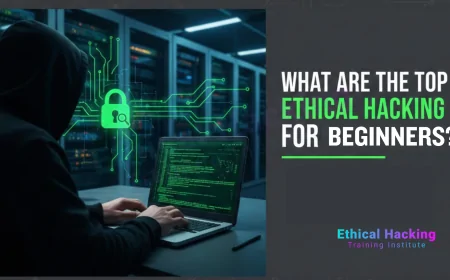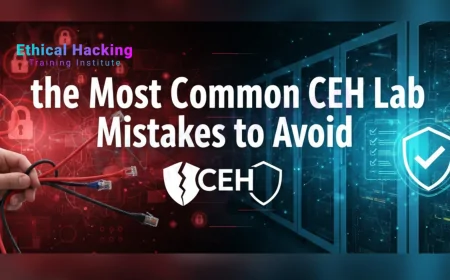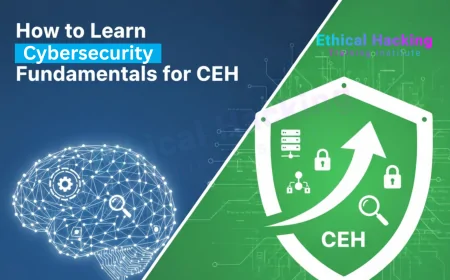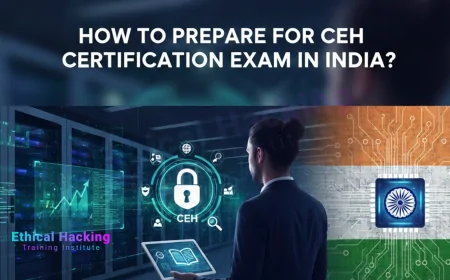CEH Certifications: Everything You Need to Know to Get Certified | Everything You Should Know About CEH Certification Before You Start
A complete guide to CEH certification: eligibility, training paths, exam structure, hands-on labs, career benefits, costs, renewal, and 20 FAQs included.
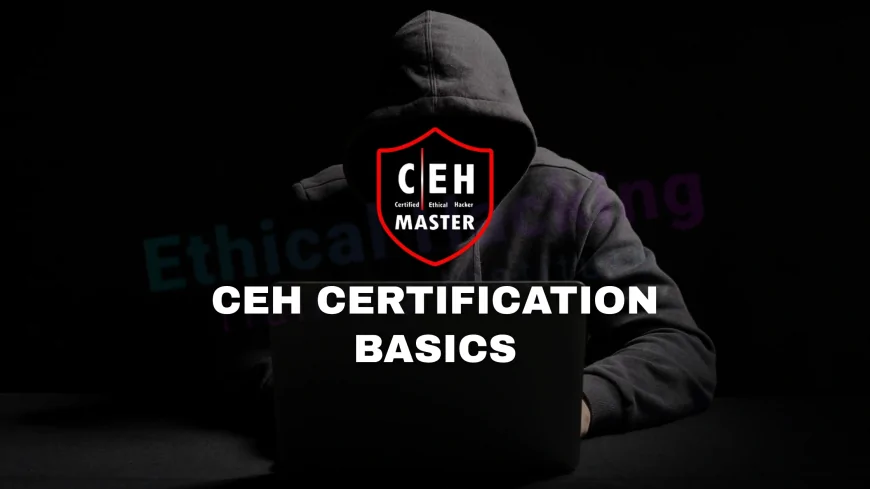
Table of Contents
- Introduction
- What Is CEH?
- Why Choose CEH?
- Eligibility & Prerequisites
- Training & Study Pathways
- Curriculum & Skills Covered
- Hands-On Labs & Practical Prep
- Exam Format & Scoring
- Preparation Strategies
- Exam Day Tips
- After-Certification Steps
- Career Path & Market Outlook
- Costs & Return on Investment
- Renewal & Continuing Education
- CEH Master: Theory + Practical
- FAQs
- Conclusion
Introduction
The Certified Ethical Hacker (CEH) certification from EC‑Council is an internationally recognized mark of expertise in cybersecurity. In this guide, we'll walk you through everything you need to know—from prerequisites and training to labs, exam strategy, career impact, and beyond.
What Is CEH?
The CEH is a vendor-neutral certification that validates your ability to think and act like a hacker—legally and ethically. It covers techniques used by malicious actors, along with defenses against them.
Why Choose CEH?
- Industry-Standard Recognition: Favored by governments, IT firms, and security departments.
- Strong Career Upside: Positions you for roles like penetration tester, SOC analyst, and security consultant.
- Skill Validation: Highlights your operational knowledge of industry-standard tools used in ethical hacking and network security.
- Global Mobility: Recognized and respected worldwide.
Eligibility & Prerequisites
Eligibility for the CEH exam requires one of the following:
- Complete official EC‑Council training (iClass, ATC, or e-learning), or
- Have a minimum of 2 years in information security and submit proof during application.
Understanding the basics of networking, scripting, and OS environments is essential for effective learning.
Training & Study Pathways
- Instructor‑led (classroom or online): Interactive, scheduled format with live guidance.
- Self‑paced modules: Study on your schedule with self-paced lessons and purchasable lab exercises.
- Bootcamps: Intensive, short-duration courses with labs included.
- Self-study: Leverage books, video tutorials, forums, plus home labs.
Trusted platforms such as EC‑Council, Simplilearn, Udemy, GreyCampus, and Pluralsight offer certified courses.
Curriculum & Skills Covered
CEH v13 features 20 modules, including:
- Reconnaissance & Footprinting
- Scanning & Enumeration
- System Hacking & Malware
- Sniffing & Social Engineering
- Web App, Wireless, Mobile, IoT, Cloud Exploitation
- Cryptography & Reporting
- MITRE ATT&CK integration and new toolsets
Hands-On Labs & Practical Prep
Practice makes perfect—and CEH is no exception. EC‑Council provides iLabs, cloud-hosted labs with guided and challenge-based exercises. Additionally, platforms like TryHackMe, Hack The Box, and self-built labs help reinforce skills.
Exam Format & Scoring
The CEH exam consists of 125 multiple-choice questions in 4 hours. Each version has a passing threshold ranging from ~60–85%, evaluated via adaptive scoring.
Preparation Strategies
- Follow the official exam blueprint.
- Build and document labs on your own.
- Use mock tests regularly from Boson, PrepAway, EC‑Council iLearn.
- Create cheat sheets for tools and command syntaxes.
- Join forums like Reddit, Discord, and TechExams for peer support.
Exam Day Tips
- Complete system checks, camera, and workspace setup if remote.
- Answer easier questions first, flag ambiguous ones.
- Allocate ~1.8 minutes per question; keep track of time.
- Review flagged questions if time remains.
After-Certification Steps
- Pursue CEH Practical to achieve CEH Master status.
- Earn 120 ECE credits over the next 3 years for renewal.
- Add your certification and labs to LinkedIn, GitHub or your resume.
Career Path & Market Outlook
CEH opens doors to roles such as:
- Penetration Tester: $80k–130k
- SOC Analyst: $70k–110k
- Security Consultant: $90k–150k
- Red Team Specialist: $90k–160k
Costs & Return on Investment
| Item | Typical Cost |
|---|---|
| Exam Voucher | $550–1,199 |
| Training Packages | $900–2,500 |
| Lab Access (iLabs) | $100–300 |
On average, return on investment can occur within 6–12 months via salary upgrade or promotion.
Renewal & Continuing Education
To renew your certification, submit 120 ECE credits earned via webinars, courses, writing, speaking, or volunteering, and pay the renewal fee every 3 years.
CEH Master: Theory + Practical
CEH Master is the elite designation awarded by EC-Council to cybersecurity professionals who pass both the CEH multiple-choice theory exam and the CEH Practical skills-based exam. This dual-certification format ensures that candidates are not only knowledgeable about ethical hacking concepts but also capable of applying them in real-world situations.
What Is CEH Master?
To earn the title of CEH Master, a candidate must pass two critical components:
- CEH (ANSI) Theory Exam: 125 multiple-choice questions based on the CEH v13 curriculum.
- CEH Practical Exam: A 6-hour hands-on hacking exam that tests practical skills in a live environment.
The CEH Master credential is considered a strong indicator of both theoretical knowledge and technical proficiency in ethical hacking.
What Is the CEH Practical Exam?
- Duration: 6 hours
- Environment: Real-world virtual lab
- Tasks: 20 challenges simulating real-time scenarios such as network scanning, enumeration, vulnerability exploitation, privilege escalation, etc.
- Passing Score: 70% (based on challenge completion)
Why Earn CEH Master?
- Industry Respect: Combines CEH’s global reputation with practical verification of skills.
- Job Readiness: Demonstrates you can perform offensive security tasks, not just understand them.
- Career Edge: Helps in securing advanced cybersecurity roles like Penetration Tester, Red Team Analyst, or Ethical Hacking Consultant.
Topics Covered in the Practical Exam
- Footprinting & Reconnaissance
- Scanning Networks
- Enumeration
- System Hacking
- Sniffing
- Web Application Attacks
- SQL Injection
- Session Hijacking
- Malware Threats
- Cloud and IoT Attacks
How to Prepare for CEH Master
- Complete the CEH v13 course and theory exam first.
- Spend at least 30–40 hours in hands-on labs (EC-Council iLabs, Hack The Box, TryHackMe).
- Review practical use of tools like Nmap, Metasploit, Burp Suite, Nikto, John the Ripper, Hydra, etc.
- Study write-ups of real-world CTFs and past CEH Practical exam experiences (from forums like TechExams).
CEH Master Credential: What You Receive
- A digital and printable CEH Master certificate
- CEH Master badge for LinkedIn and resumes
- Listing in EC-Council’s Certified Professional directory
By earning the CEH Master certification, you prove you not only understand ethical hacking but can also perform it in live, high-pressure, hands-on scenarios—an invaluable asset to any cybersecurity team or organization.
Frequently Asked Questions
1. What is the CEH certification?
CEH (Certified Ethical Hacker) is an EC‑Council credential validating ethical hacking skills and knowledge.
2. Who can take the CEH exam?
Anyone with EC‑Council training or two years of security work experience can apply.
3. How much does the CEH certification cost?
Voucher costs range from $550–1,199; training packages vary between $900–2,500.
4. How long is the CEH certification valid?
Three years; renewal requires earning 120 ECE credits and paying a renewal fee.
5. What is the CEH exam format?
The exam features 125 multiple-choice questions over four hours.
6. What score is needed to pass CEH?
Passing scores vary by exam version, typically between 60–85%.
7. What skills does CEH cover?
Reconnaissance, scanning, system hacking, web app hacking, wireless, IoT, cloud, cryptography, and report writing.
8. What are iLabs?
iLabs are EC‑Council’s cloud-based lab platform that provides real-world practice environments.
9. Can I self-study for CEH?
Yes, but you’ll need textbooks, online modules, and access to labs.
10. What is CEH Practical?
A hands-on test where you perform real-world hacking tasks under time constraints.
11. What is CEH Master?
CEH Master is awarded after passing both theory and practical exams.
12. How do I prepare for the CEH exam?
Use official courseware, labs, mock tests, and community resources.
13. How long does preparation take?
Ranges from 3 to 6 months depending on your study pace and background.
14. Is CEH globally recognized?
Yes, it's recognized and respected across industries worldwide.
15. Does CEH require programming skills?
Not strictly, but basic scripting helps with automation and understanding exploits.
16. What career roles can CEH help me get?
Roles include Penetration Tester, SOC Analyst, Security Consultant, Red Team Specialist.
17. How can I maintain CEH?
Collect 120 ECE credits through webinars, courses, writing, or volunteering every 3 years.
18. Can CEH help with bug bounty?
Absolutely—it equips you with techniques and methodologies used in real-world vulnerability hunting.
19. Do employers value CEH?
Yes—many organizations list CEH as a requirement or preferred qualification.
20. What’s next after CEH?
Consider advanced certifications like OSCP, GPEN, CISSP, cloud or malware-focused credentials.
Conclusion
The CEH certification is more than a credential—it equips you with a proven methodology, practical tools, and ethical frameworks essential for cybersecurity roles. With preparation, hands-on practice, and strategic career planning, CEH sets a solid foundation for sustained professional growth in information security.
What's Your Reaction?
 Like
0
Like
0
 Dislike
0
Dislike
0
 Love
0
Love
0
 Funny
0
Funny
0
 Angry
0
Angry
0
 Sad
0
Sad
0
 Wow
0
Wow
0






